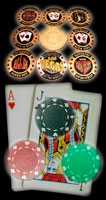A Very Strong Hand That Can Improve
In a tight game, you might sometimes want to slow play poker very strong hands to give others a chance to catch up.
The bet size on the turn is larger, and a slow play might gain a caller if you wait until they’ve had a chance to catch up with you.
In more typical games, it usually doesn’t pay to slow play. Even when you have a very strong hand, the chances are pretty good that others have flopped some kind of hand and will likely call bets both on the flop and the turn.
You usually don’t need to give anyone a chance to catch up. In looser games or in very aggressive games, slow play almost never pays.
You have the best of both worlds with a very strong hand that has good improvement chances when you’re in a very loose, very aggressive game.
You probably have the best poker hand, many of the callers will be drawing almost dead, and about one-third of the time your hand will get even better.
Play these kinds of hands very aggressively in the wilder type games. You’ll be paid off handsomely.
Examples of very strong hands that can improve are A ![]() A
A ![]() with a flop of A
with a flop of A ![]() K
K ![]() Q
Q ![]() or J
or J ![]() J
J ![]() with a flop of A
with a flop of A ![]() J
J ![]() 10
10 ![]() or 10
or 10 ![]() 9
9 ![]() with a flop of 10
with a flop of 10 ![]() 9
9 ![]() 3
3 ![]() .
.
A Very Strong Hand That Won’t Improve
By this kind of hand, I mean a flopped straight, flush, or full house.
Playing a Straight
One example of when straightforward aggressive play is the best course to follow is when you have a straight.
When you have a straight, there is some chance another player has two pair. That’s because the cards that make your straight are connected cards, the kind of hands Holdem players like to play.
Other draws to beat you are likely out there also, draws to better straights and flushes. Therefore straights should usually be played aggressively, but not always.
If there are a lot of draws out to beat your straight, and this is not uncommon, then you are in a similar situation to the top pair or the pocket Jacks in the hand we discussed earlier in this chapter.
In that case you should slow down on the flop. This is particularly true if the flop is
two-suited, containing a flush draw, and the game is very loose and aggressive.
For example, let’s say you have a 8 ![]() 6
6 ![]() in late position in a very loose and aggressive game. The flop is 10
in late position in a very loose and aggressive game. The flop is 10 ![]() 9
9 ![]() 7
7 ![]() .
.
If the action is hot and heavy before it gets to you, you might want to think about folding this straight. You might have the best hand right now, but you might not.
If your hand is not best now, then you have no chance to win this pot and will end up putting a lot more money in it. Even if you are best, you have to worry about any Heart, an 8, a Jack, a 10, a 9, or a 7.
There are many cards that have the possibility of beating your hand even if it is best now. I’m not saying you should always fold it, but you should consider folding in a very loose and aggressive game if there has been action like a bet, a call, then two raises before the action reaches you.
There is a good chance you are beaten, and if you aren’t there is a good chance you will be before it’s all over.
The situation is a little different if you have, for example, a 10 ![]() 8
8 ![]() and the flop is 9
and the flop is 9 ![]() 7
7 ![]() 6
6 ![]() . Now you know you have the best hand.
. Now you know you have the best hand.
There’s no folding this hand. If the poker game is very loose and aggressive, and the action is similar to what I described earlier, you probably don’t want to put in the last raise unless you think raising will limit the callers to two or three players.
Any more callers than that and the collective outs they have are very likely to combine in such a way that your hand won’t profit that much from the best on the flop.
If the turn card doesn’t help any of the possible draws (maybe a black Ace falls on the turn), then raise away with this hand.
Play it aggressively on the turn, but only if the turn card doesn’t complete any of the draws that could beat you.
In a tighter game, both these hands play a little differently. With either, if you only have two or three other active players on the flop, a straight is still very vulnerable.
With few opponents, flopping a straight probably gives you the best hand.
Flops like those already discussed do present risks however, and in a tight or typical game,the hand should be played very aggressively while it’s still the best hand.
Pick the Right Table / Picking a Seat / Theories of Poker / Betting Theory: The Odds
A Theory of Starting Hand Value
A Theory of Flop Play: Counting Outs and Evaluating Draws
The Dynamics of Game Conditions / Table Image / Player Stereotypes
Women and Poker / Spread-Limit Games / Double Bet on the End Games / Kill Games
Short-handed Games / Tournaments / No-limit and Pot-Limit Poker



